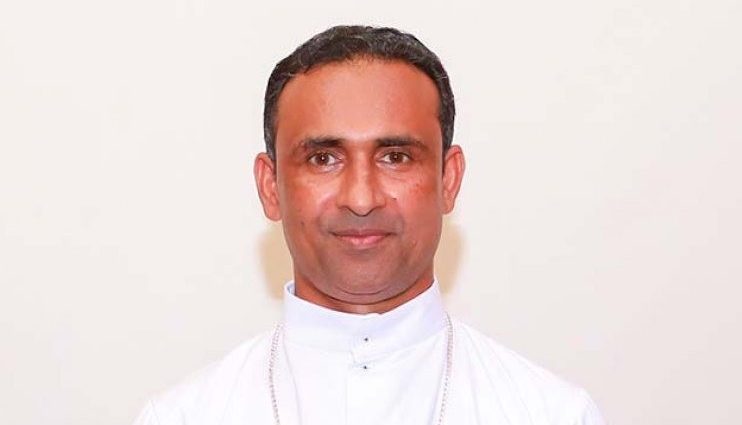By Matters India Reporter
New Delhi, Aug 26, 2023: Pope Francis on August 26 appointed Father Mathew Nellikunnel as the bishop of Gorakhpur diocese in the northern Indian state of Uttar Pradesh.
The formal announcement of the appointment was done at 12 noon Italian time at the Vatican and at 3:30 pm Indian time at the St Thomas Mount, the Church’s headquarters in Kakkanad, a suburb of Kochi, Kerala.
Cardinal George Alencherry, head of the Church, announced the appointment in the presence of the members of the Synod.
Earlier, the 31st Synod of the Syro Malabar Church had elected Father Nellikunnel, a member of Congregation of St Theresa, to replace Bishop Thomas Thuruthimattam of Gorakhpur, who has retired. The self-governing Church can appoint its bishop with the approval of the Pope.
The new bishop was vested with the insignia of the episcopal office by the cardinal and Bishop Thuruthimattam.
He is elder brother of Bishop John Nellikunnel of Idukki, Kerala.
The bishop-elect is currently serving as the rector of congregation’s major seminary in Aluva, Kerala.
The bishop-elect was born on November 13, 1970, as the first child of Varkey and Mary Nellikunnel, parishioners of St Mary’s Church, Mariapuram in Kerala’s Idukki district.
After school studies, he joined the congregation’s minor seminary of Khrist Jyoti Province, Punjab-Rajasthan. He made his first profession in 1990 and the final eight years later. He was ordained a priest on December 30, 1998, by Bishop George Punnakottil of Kothamangalam.
After ordination, he served the congregation in various capacities such as assistant novice master, rector of the minor seminary, parish priest, and school manager.
In 2005 he left for higher studies in Rome where he secured doctorate in philosophy. He was then appointed teacher at Little Flower Major Seminary, Aluva. Later, he undertook pastoral ministry for three years in the diocese of Regensburg in Germany.
In 2015, he was elected the provincial of Khrist Jyoti province, Punjab-Rajasthan. After the completing the term in 2018, he was appointed rector of the Little Flower Major Seminary.
The bishop-elect is proficient in many languages such as English, Hindi, German and Italian, besides his mother tongue Malayalam.
The diocese of Gorakhpur on the Nepal border was created in 1984 with Dominic Kokkatt, a member of the same congregation as its first bishop. Bishop Thuruthimattam replaced him in 2006.


Hearty congratulations. Wishing the new bishop and his flock divine blessings.
There is NO transparency in the appointment of bishops and also of parish priests. They are just dumped on the Laity (of a diocese and/or parish) who have no say. There is hardly any transparency in the Catholic Church. As Chhotebhai mentioned, in Bengal too the Hierarchy is controlled by mainly by those hailing from Mangalore (case study the new bishop of Asansol and the current bishop of Calcutta Archdiocese – both are from Mangalore). Even the educational institutions for example Jesuits at St Xavier’s in Bengal are being dominated by priests from a particular region. I think this domination by a particular community / section helps in oneness of spirit, culture, culinary habits and of course control of funds within the community!
There are many cases of two brothers from the same family becoming bishops in India. Plus there are uncle-nephew bishops and close relatives becoming bishops.
Is this the PARIVARVAAD about which Modi criticizes regularly? If so, then, the CBCI/CCBI must maintain it confidentially. If Modi comes to know about it, then, he will definitely jump on the Catholic prelates. BEWARE!
This also makes the laity to think that there is an UTTER SCARCITY of eligible candidates among priests. If there are other eligible candidates, then, why are they sidelined? Is this not a clear evidence of dirty politics played in the selection process?
How is it that brothers get appointed as bishops? This is not the first such instance. The former Archbishop of Agra’s brother was a Bishop in Bengal. In U.P. most bishops and priests hailing from Mangalore Udipi are closely related to each other. In another recent appointment the bishop has 3 or 4 close relatives as priests in his small diocese. Will this not encourage nepotism? One wonders more and more about the selection process of bishops and the total blackout of the laity.
I have no intention of questioning the credentials of the individuals. My objection is to the choice of close relatives. It is indeed disappointing